Emergency HVAC Saltford
Find the best After Hours HVAC in Saltford
Receive up to 3 Emergency Furnace Repair quotes for your project today! Compare profiles, reviews, accreditations, portfolio, etc... and choose the best service.
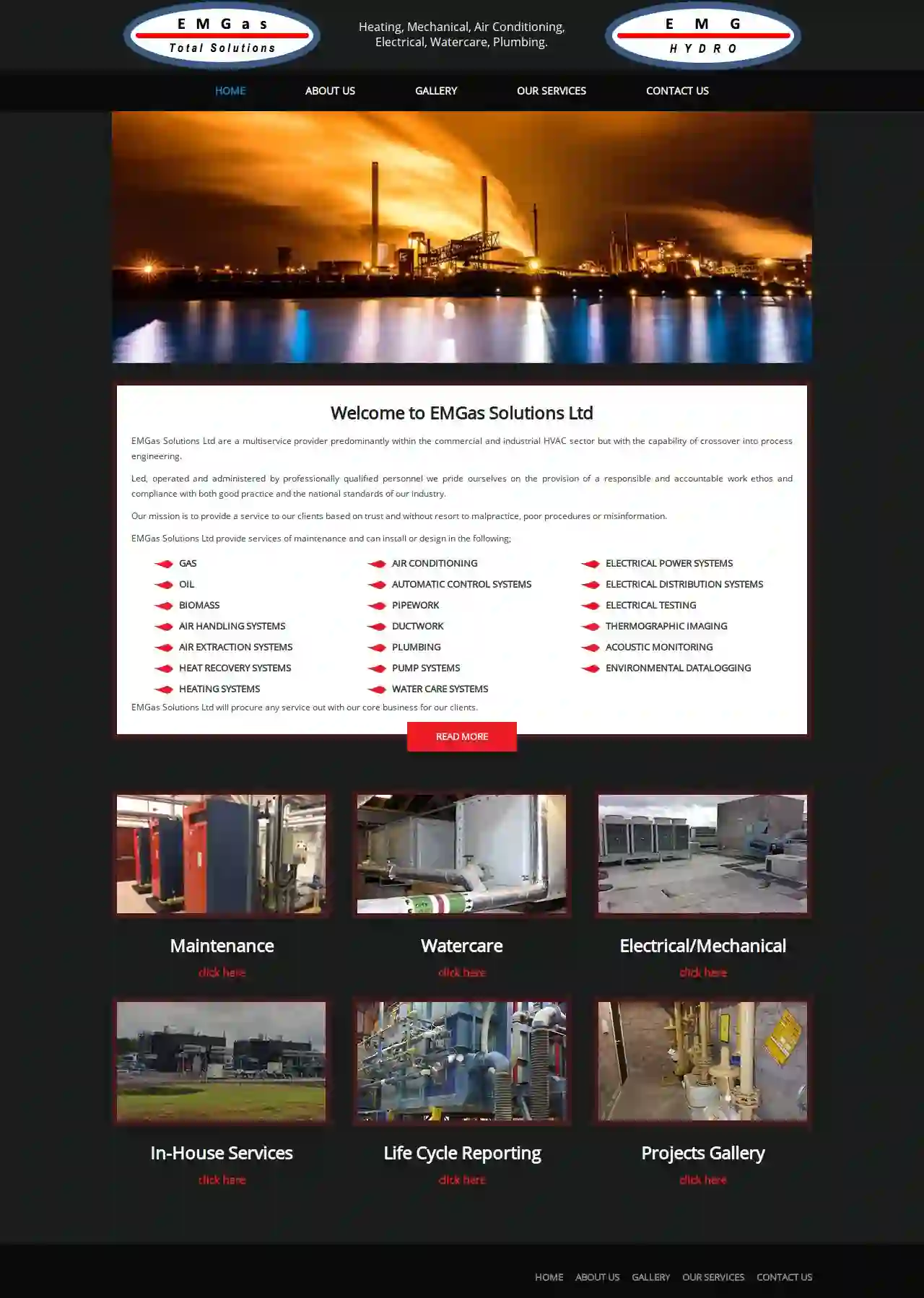
EMGas Solutions Ltd
Bath, GBEMGas Solutions Ltd are a multiservice provider predominantly within the commercial and industrial HVAC sector but with the capability of crossover into process engineering.Led, operated and administered by professionally qualified personnel we pride ourselves on the provision of a responsible and accountable work ethos and compliance with both good practice and the national standards of our industry.Our mission is to provide a service to our clients based on trust and without resort to malpractice, poor procedures or misinformation.EMGas Solutions Ltd provide services of maintenance and can install or design in the following;Gas Oil Biomass Air Handling Systems Air Extraction Systems Heat Recovery Systems Heating Systems Air Conditioning Automatic Control Systems Pipework Ductwork Plumbing Pump Systems Water Care Systems Electrical Power Systems Electrical Distribution Systems Electrical Testing Thermographic Imaging Acoustic Monitoring Environmental Datalogging EMGas Solutions Ltd will procure any service out with our core business for our clients.
- Services
- Why Us?
- Gallery
Get Quote
AC Electrical & Plumbing Services
4.49 reviewsShepton Mallet, GBAC Electrical Services is your one-stop provider of quality repairs to your electrical and plumbing systems for domestic, commercial and light industrial clients. Ensuring a personal service to all our customers, we provide a tailored response to your requirements with a free quotation, fair pricing and experienced advice with the most appropriate solutions. From minor electrical or plumbing repairs to full bathroom re-fits – we provide a full range of services including: SHOWERS – SINKS – W.C.’s – TILING – EXTRACT FANS – LIGHTING – TOWEL RAILS With over 30 years of experience as an owner operator, I have the skills and knowledge to advise clients on the optimum and most expedient methods to identify and resolve your plumbing and electrical needs. Quality renovations and improvements undertaken with appointment times to suit you and 24-hour emergency call outs. We follow strict Covid-19 compliance to stop the spread of coronavirus and keep ourselves and clients safe. Masks will be worn and 2m social distancing observed where possible according to works with regular use of hand sanitiser. Check out our Google Reviews! Electrical From fault finding, diagnosis, and repairs, through to improvements, enhancements and new installations. This includes additional sockets including USB’s, garden and security lighting, and internal design and fit. We can provide expert advice on the best solutions. Plumbing From minor leaks to full bathroom installation including tiling, replacements to showers, taps, radiators, TRV’s, shower pumps and immersion heaters. We can provide expert advice on the best solutions. What our customers have said... ‘You showed up when you said you were going to, charged as quoted and the whole process was straightforward and really efficient!’ Lee Batcombe ‘Ours is an older property with complex and dated systems and you identified the best way to resolve our water pressure issue completed the works on time within budget and it worked!’ Mary Wells ‘Our shower had never worked correctly – the pump you fitted gave us a hotel quality power shower that all the family now enjoy’ James Shepton Mallet ‘We needed our garden and driveway lit and you planned and installed a system that gave us both security and ambient lighting that meant we could use our outdoor space all year’ Teresa Glastonbury We have also worked with a range of light industrial / commercial clients including Shepton Prison Tours and Film Productions; Simon Heal Estate Agents in Somerset; Wyke Cheese Factory; Subway in Somerset; Waltons; Evercreech Fish Bar; and various businesses at Wapping Wharf in Bristol. Just to name a few!
- Services
- Why Us?
- Our Team
- Testimonials
- Gallery
Get Quote
Hannah & Howie Services Ltd
513 reviewsWardpark East Ind Est, Cumbernauld, 26 Tollpark Road, G68 0LW, GBTRUSTWORTHY AND RELIABLE HEATING AND PLUMBING ENGINEERS BOILER INSTALLATION SERVICE & REPAIRS COMMERCIAL SERVICES Up to 12 years manufacturers guarantee available on Worcester Bosch boilers Worcester Bosch has been awarded a Which? Best Buy award for the most reliable boiler brand across the entire Greenstar gas boiler range. GET IN TOUCH WITH US TODAY TO DISCUSS YOUR DOMESTIC OR COMMERCIAL HEATING REQUIREMENTS. Our experienced and helpful staff are always on hand and happy to help. Call us today 01236 737 414 WHY CHOOSE HANNAH & HOWIE? If you require cost effective, reliable heating engineers then look no further. Operating throughout Cumbernauld and the surrounding areas. we cater to all domestic and business client’s central heating systems and gas services requirements. Established since 1977, we have the knowledge and expertise needed to ensure that you receive nothing but the best service. Our reputation has been developed through hard work and reliability which is why we are the area’s number one choice for heating and gas related work. Whether you are a private or commercial customer looking for a personal service or a Landlord looking for someone to look after your complete heating needs then Hannah & Howie (L.P Gas) Services Ltd can deliver what you need. For a no obligation estimate, please call 01236 737 414 or 07976 959 245 or contact us. Experienced; over 42 years in the trade Professional and quality service Fully Insured Gas safe registered Covering Glasgow and surrounding areas WE ARE A WORCESTER ACCREDITED INSTALLER Worcester Accredited installers are recognised domestic and commercial heating companies that meet or exceed the standards of sustained quality of installation, service and customer care. These installers are accessible through the official Worcester Bosch website. Worcester Bosch ensure our clients receive a high standard of workmanship and professionalism, our accredited companies are monitored by several recognised trade and industry bodies. Visit our page here READ OUR CUSTOMER REVIEWS FROM CHECKATRADE & WHICH? Please visit our Checkatrade and Which? Trusted Trader profiles to read our reviews from our customers. We offer you the highest quality workmanship and services Our Services Include: Energy efficient advice Power flushing Boiler installations Gas Safety inspections Pump repairs Boiler repairs Boiler replacements Immersion tank replacements and repairs Boiler servicing Landlord Safety Certificates Central heating installations Find out more Call us today Areas We Cover We provide gas and central heating services to homes and businesses across Glasgow and surrounding areas. Airdrie Bothwell Bonnybridge Bridge of Allan Coatbridge Cumbernauld Dunblane Edinburgh Glasgow Hamilton Kalhil Kirkintilloch Motherwell Stirling 01236 737 414 07976 959 245 26 Tollpark RoadWardpark East Ind EstCumbernauldGlasgow, G68 0LW
- Services
- Why Us?
- Accreditations
- Gallery
Get Quote
Saacke
4.73 reviewsBath, GBSAACKE is a leading global provider of innovative solutions for the energy and process industries. Our products and services include plant modernization, plant automation, fuels, shell boilers, GTA auxiliary combustion systems, thermal exhaust air purification, thermal oil heaters, drying processes, and water-tube boilers. We also offer power-to-X: hydrogen solutions, customer service, and industry references. Our company has a strong focus on research and development, corporate responsibility, and quality. We are committed to providing our customers with the best possible solutions and services.
- Services
- Why Us?
- Accreditations
- Our Team
- Gallery
Get Quote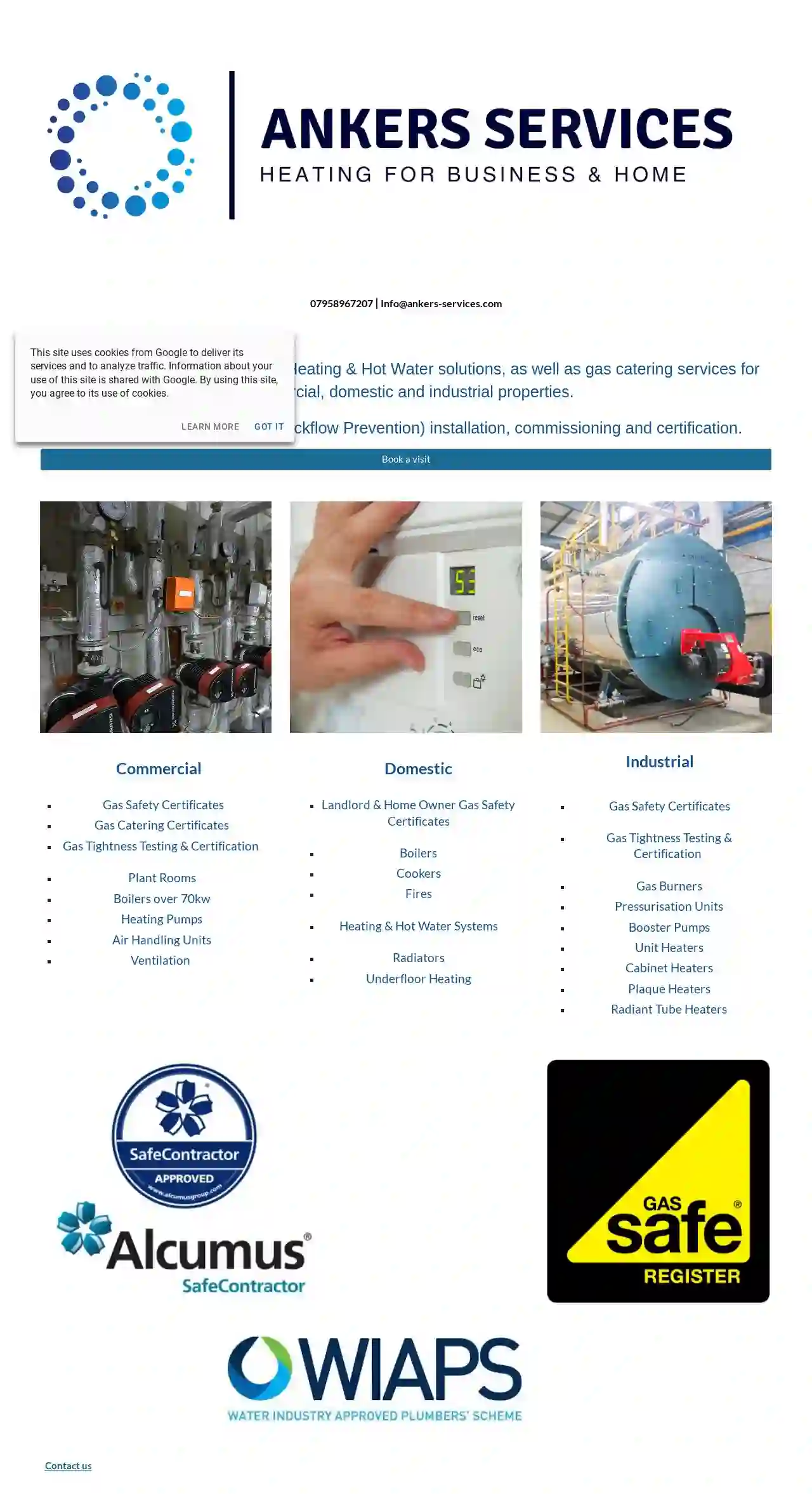
Ankers Services Ltd - Gas Heating Services
55 reviewsBath, GBAnkers Services offer a range of Heating & Hot Water solutions, as well as gas catering services for commercial, domestic and industrial properties. We also provide RPZ Valve (Backflow Prevention) installation, commissioning and certification. Book a visit Commercial Gas Safety Certificates Gas Catering Certificates Gas Tightness Testing & Certification Plant Rooms Boilers over 70kw Heating Pumps Air Handling Units Ventilation Domestic Landlord & Home Owner Gas Safety Certificates Boilers Cookers Fires Heating & Hot Water Systems Radiators Underfloor Heating Industrial Gas Safety Certificates Gas Tightness Testing & Certification Gas Burners Pressurisation Units Booster Pumps Unit Heaters Cabinet Heaters Plaque Heaters Radiant Tube Heaters Contact us 07958967207 | [email protected]
- Services
- Why Us?
- Gallery
Get Quote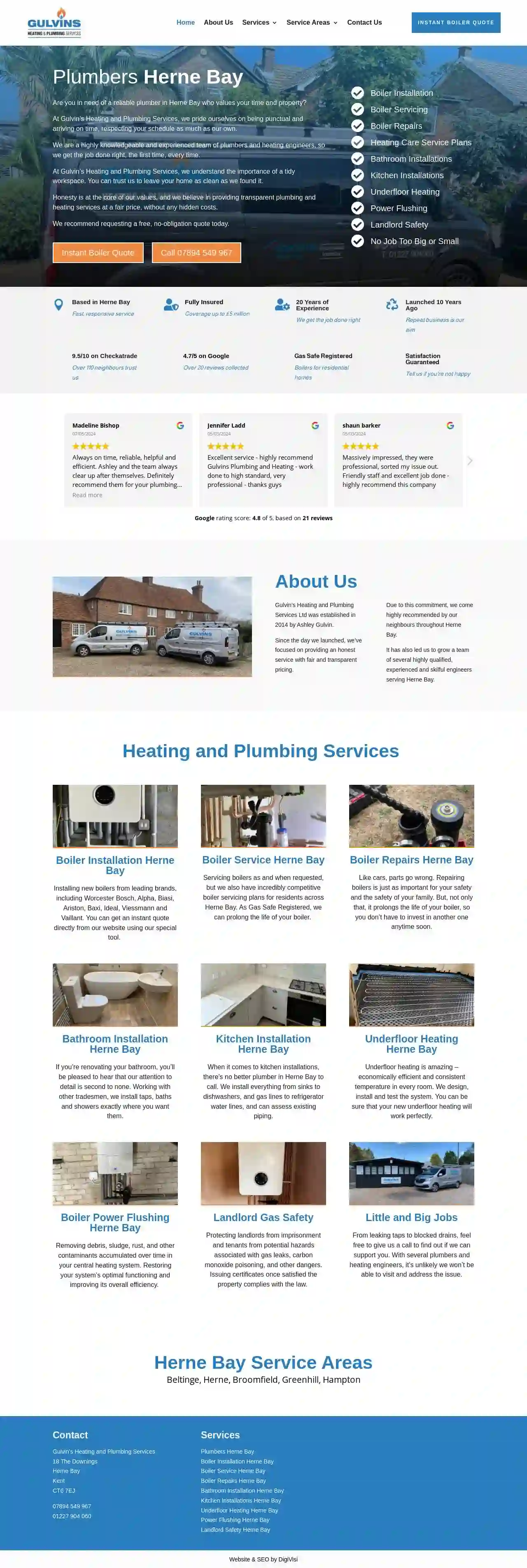
Gulvins Heating and Plumbing Services Ltd - Plumber Herne Bay
4.718 reviews18 The Downings, Herne Bay, CT6 7EJ, GBGulvin's Heating and Plumbing Services Ltd was established in 2014 by Ashley Gulvin. Since the day we launched, we've focused on providing an honest service with fair and transparent pricing. Due to this commitment, we come highly recommended by our neighbours throughout Herne Bay. It has also led us to grow a team of several highly qualified, experienced and skilful engineers serving Herne Bay. We pride ourselves on being punctual and arriving on time, respecting your schedule as much as our own. We are a highly knowledgeable and experienced team of plumbers and heating engineers, so we get the job done right, the first time, every time. At Gulvin's Heating and Plumbing Services, we understand the importance of a tidy workspace. You can trust us to leave your home as clean as we found it. Honesty is at the core of our values, and we believe in providing transparent plumbing and heating services at a fair price, without any hidden costs. We recommend requesting a free, no-obligation quote today.
- Services
- Why Us?
- Our Team
- Testimonials
- Gallery
Get Quote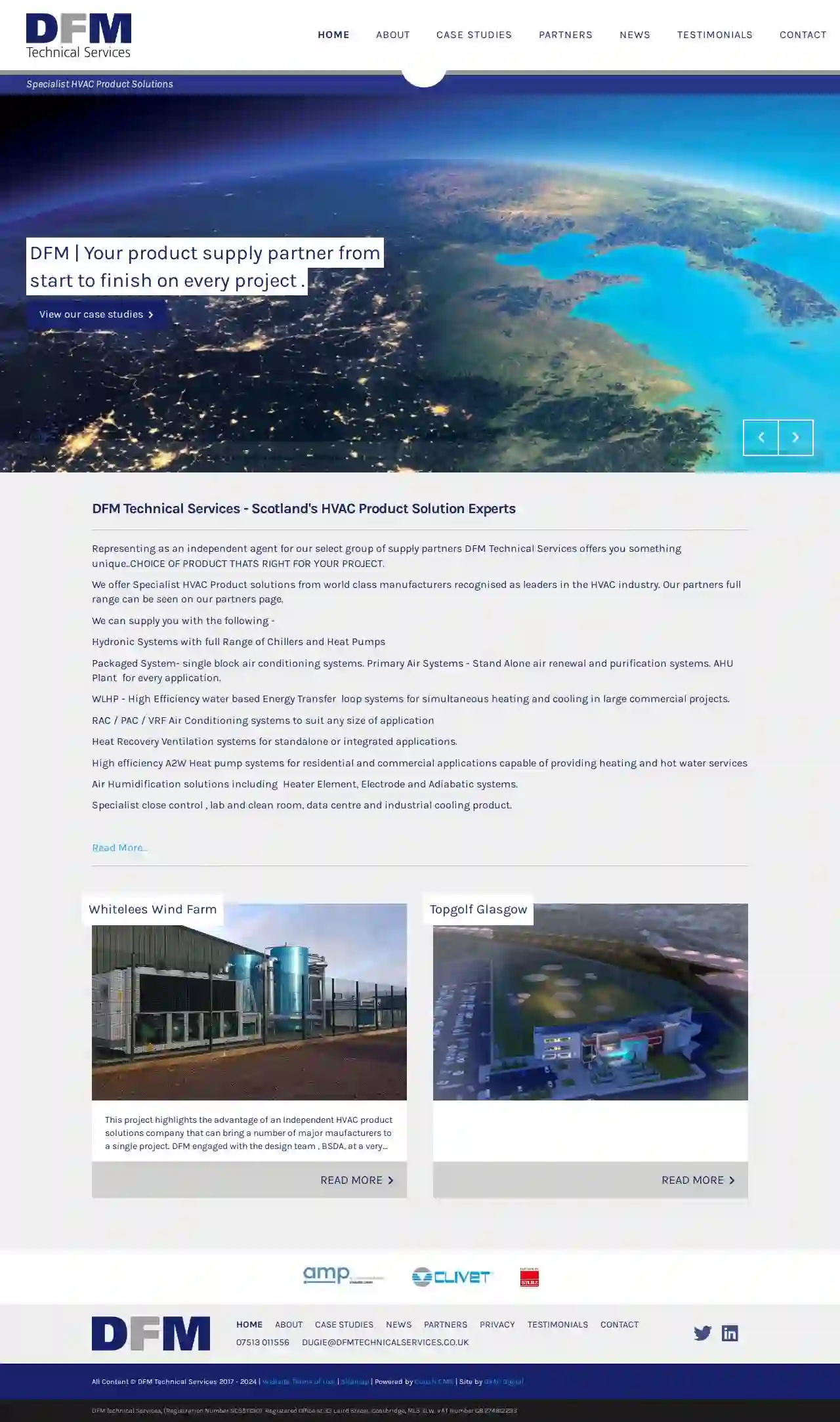
DFM Technical Services
33 Laird Street, Coatbridge, ML5 3LW, GBDFM Technical Services is a leading HVAC product solution expert in Scotland, representing independent agents for select supply partners. We offer a wide range of specialist HVAC products from world-class manufacturers, recognized as leaders in the industry. Our partners' full range can be seen on our partners page. We supply hydronic systems, packaged systems, primary air systems, AHU plant, WLHP, RAC/PAC/VRF air conditioning systems, heat recovery ventilation systems, high-efficiency A2W heat pump systems, air humidification solutions, and specialist close control, lab, and clean room, data centre, and industrial cooling products. Our team has extensive experience in providing HVAC solutions for various applications, including residential, commercial, and industrial projects.
- Services
- Why Us?
- Gallery
Get Quote
John Heaney (Electrical) Limited
410 reviewsBrucefield Industry Park, 4 Cochrane Square, Livingston, EH54 9DR, GBJohn Heaney (Electrical) Limited is an Electrical and Mechanical Company, located in West Lothian with nationwide coverage. We specialise in all types of Industrial and Commercial Mechanical and Electrical Installations including, but not limited to, HV/LV Maintenance, HV Installation, EV Charger Install, Production Line Installation, H.V.A.C Controls / Panel Manufacture, Building Maintenance, Facilities Management, Industrial support service, re-manufacturing, and mechanical repairs. Our experienced and highly motivated staff can tackle all aspects of Electrical and Mechanical Installation and Maintenance Operations in all types of environments. As a business, our primary focus is meeting our client’s needs and consistently exceeding their expectations, serving them so well that they profit from their relationship with us and consider us as their contractor of choice.
- Services
- Why Us?
- Accreditations
- Our Team
- Gallery
Get Quote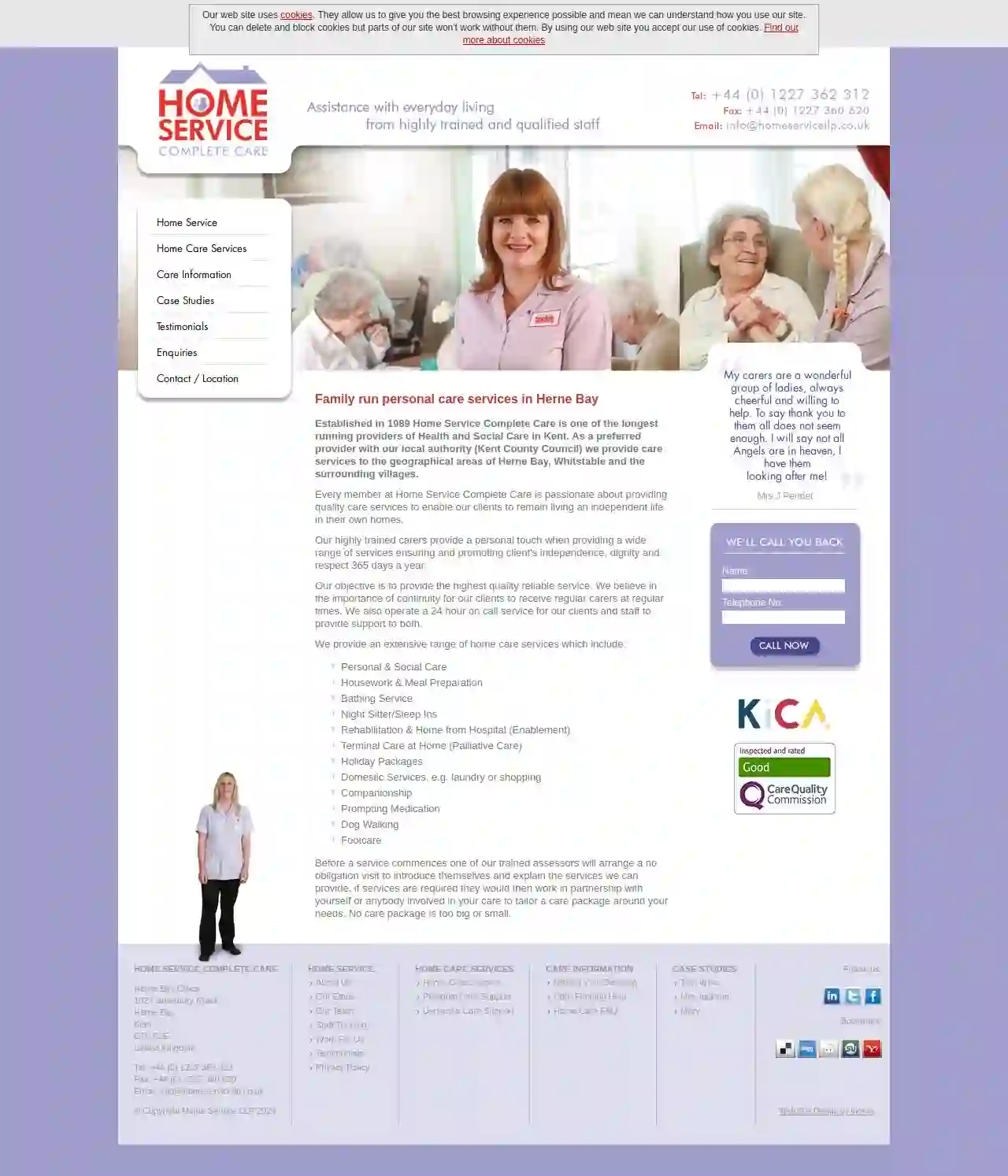
Home Service Complete Care LLP
102 Canterbury Road, Herne Bay, CT6 5SE, GBEstablished in 1989, Home Service Complete Care is one of the longest running providers of Health and Social Care in Kent. As a preferred provider with our local authority (Kent County Council) we provide care services to the geographical areas of Herne Bay, Whitstable and the surrounding villages. Every member at Home Service Complete Care is passionate about providing quality care services to enable our clients to remain living an independent life in their own homes. Our highly trained carers provide a personal touch when providing a wide range of services ensuring and promoting client's independence, dignity and respect 365 days a year. Our objective is to provide the highest quality reliable service. We believe in the importance of continuity for our clients to receive regular carers at regular times. We also operate a 24 hour on call service for our clients and staff to provide support to both.
- Services
- Why Us?
- Testimonials
- Gallery
Get Quote
Complete Gas Heating Services Ltd
594 reviewsBath, GBComplete Gas Heating Services is a domestic and commercial company based in Bath, with over 25 years' experience including 14 years with British Gas. We specialise and are experts in service and repair of all gas appliances with high fault finding experience, landlords CP12, CP6 etc. We also custom design for energy efficiency of all systems for installation and upgrades of all types.
- Services
- Why Us?
- Accreditations
- Gallery
Get Quote
Over 12,692+ HVAC Businesses on our directory
Our HVAC contractors operate in Saltford & surroundings!
HVACCompaniesHub has curated and vetted Top HVAC Businesses in Saltford. Find a top & trustworthy contractor today.
Frequently Asked Questions About Emergency HVAC Services
- A rotten egg smell odor
- Hissing or whistling sounds near gas lines or appliances
- Blowing dirt or bubbles in standing water
- Dead or discolored vegetation near gas lines
- Physical symptoms like dizziness, nausea, or headaches
How long does it take for an emergency HVAC technician to arrive?
How do I know if I have a gas leak?
What's the difference between a single-stage and two-stage furnace?
What is a smart thermostat, and how can it save me money?
How long does it take for an emergency HVAC technician to arrive?
How do I know if I have a gas leak?
- A rotten egg smell odor
- Hissing or whistling sounds near gas lines or appliances
- Blowing dirt or bubbles in standing water
- Dead or discolored vegetation near gas lines
- Physical symptoms like dizziness, nausea, or headaches